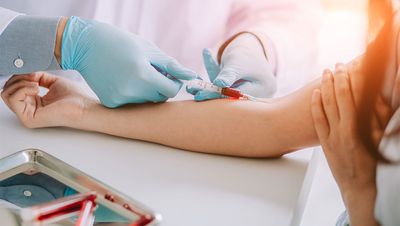BREAKING: The First U.S. Test to Detect If a Person Has Potential Immunity to COVID-19 Was Just Developed
While testing for COVID-19 ramps up around the country, there's another kind of testing that will prove equally important to combating the pandemic: one that can detect whether someone has already been infected.
"The idea is that this assay can be established anywhere in the world following these steps."
Why is this important? As former FDA commissioner Scott Gottlieb wrote in today's Wall Street Journal: "If a sizable portion of a local community has some protection, authorities can be more confident in relying less on invasive measures. Once deployed, serological tests are cheap, straightforward, and easy to scale."
Now, a microbiology lab at the Icahn School of Medicine at Mount Sinai, led by Dr. Florian Krammer, has just announced the development of this serological test. Leapsmag spoke with Daniel Stadlbauer, a post-doctoral fellow in the lab who helped lead the work.
Is yours the first serological test available?
They did something similar in South Korea. In the U.S., it's the first of these tests.
How close are we to rolling this test out to the public?
Last week, we started this process and we finished the protocol today. Mount Sinai is trying to roll this out in the next few days in the clinic to see which patients have been infected with coronavirus recently or have been infected at all.
The protocol we uploaded today can be used as a template for other research labs or hospitals to follow the steps we provided and they should then be able to set up the antibody test. The idea is that this assay can be established anywhere in the world following these steps.
Are there any bottlenecks to getting this rolled out – supply chain or regulation obstacles?
There are no regulations that say you can't do it. Research labs and hospitals for sure can do it. I'm not aware of supply chain issues because you need basic lab equipment and materials, but I don't think those are in short supply right now.
How does the test work?
People coming to the hospital who are suspected to have infection with coronavirus, their blood gets taken routinely. This blood can be used for our test, too. The test will tell you if this person has antibodies against coronavirus. You can also test the blood of people who are not currently sick to see if this person was infected, say, a month ago. If there are antibodies in the blood, you can say this person is probably immune to getting it again.
It will be essential workers who need to be tested first, like nurses, firefighters, and doctors. It will be great to know that they would not put themselves or others at risk by going back to work because they cannot spread the disease.
"People probably cannot get reinfected once they mount a good immune response and have good antibody levels."
How soon after infection does the test detect if you have antibodies?
Usually after 7 days of infection.
How long do the antibodies last to confer immunity?
Those studies need to be done – right now it's unclear. People probably cannot get reinfected once they mount a good immune response and have good antibody levels. How long those level last still needs to be investigated. But they won't get reinfected in the next, I would say, six months.
How accurate is the test?
Very accurate. The advantage – which is bad for us but good for the test – is that humans have no baseline immunity to this coronavirus. It means that when you have not been infected, you have pretty much no antibodies, which is why it can spread so easily. But once you have antibodies in your blood, we can detect them and it's a clear difference between antibodies or no antibodies.
Where should hospitals and labs go for more information on how to build their own tests from your work?
They should check out our lab website to find the detailed protocol to download.
If I am a person who just wants to take this test to find out if I've already been infected, what should I do?
It will be done soon in the clinical setting. I don't know yet how widely it will be available. The more research labs and hospitals that set up this testing, the more people who can be tested in the future.
Kira Peikoff was the editor-in-chief of Leaps.org from 2017 to 2021. As a journalist, her work has appeared in The New York Times, Newsweek, Nautilus, Popular Mechanics, The New York Academy of Sciences, and other outlets. She is also the author of four suspense novels that explore controversial issues arising from scientific innovation: Living Proof, No Time to Die, Die Again Tomorrow, and Mother Knows Best. Peikoff holds a B.A. in Journalism from New York University and an M.S. in Bioethics from Columbia University. She lives in New Jersey with her husband and two young sons. Follow her on Twitter @KiraPeikoff.
